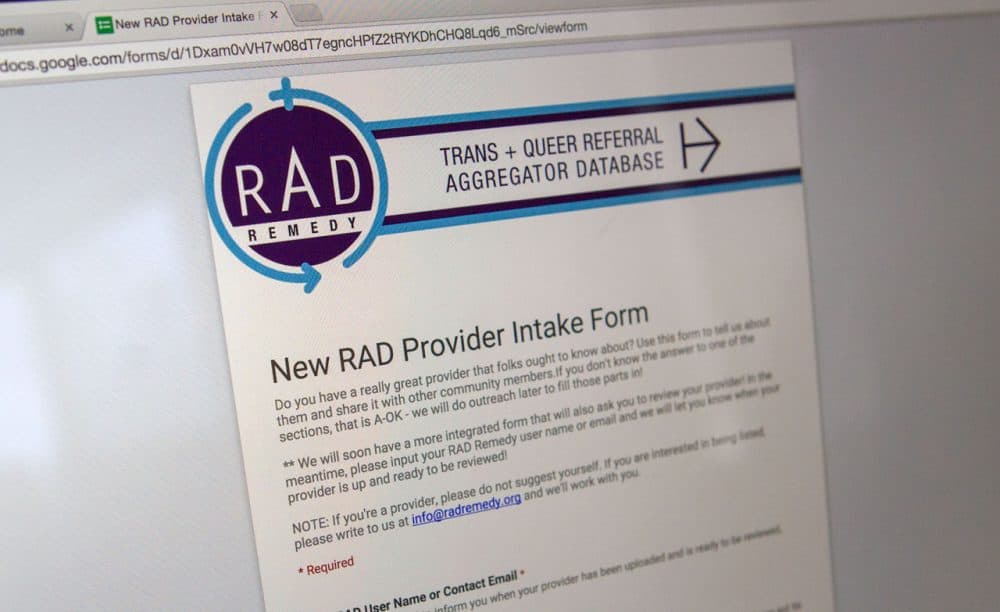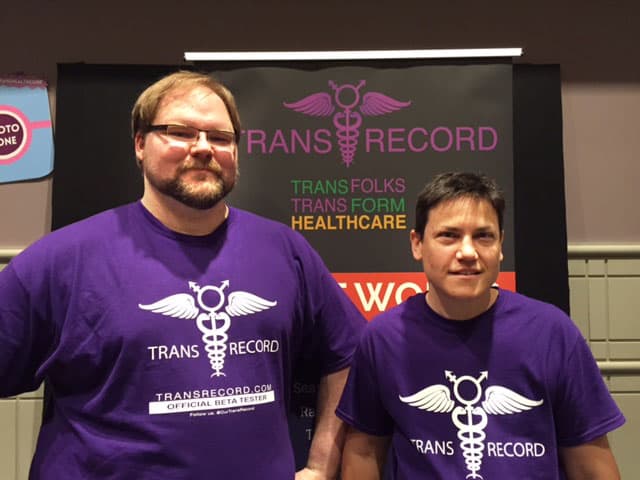Advertisement
Transgender Patients Create Their Own Networks Of 'Safe' Providers

A nurse looked at the couple: a man of medium height with a large belly and a tall, thin woman. The nurse handed the woman a small paper cup and asked for a urine sample.
"Well, that’s not really going to work because my husband is the one who’s pregnant,” the woman said. Then Karl Surkan, a transgender man who teaches gender studies at MIT, took the cup.
“Well, then I guess I need a urine sample from you,” Surkan remembered the nurse saying to him.

Other nurses and doctors might make the same mistake. Transgender men are pretty unusual in OB offices and maternity wards. The nurse in this case wasn’t hostile, Surkan said, just “not knowledgeable about the existence of masculine-looking people who are pregnant.”
Still, Surkan would give the nurse a low score on an online provider rating system he co-founded late last year — TransRecord.com. Transgender and genderfluid patients log in, name a provider, and respond to eight questions that identify a doctor, nurse or counselor as transgender friendly — or not.
“This is a population that is heavily medicalized,” Surkan said. From the pre-transition period, through a gender change, to potentially decades of hormone therapy, these patients will be frequent users of health care.
For some patients, the provider they choose may mean the difference between life and death. There are stories of transgender patients who arrive in emergency rooms and are made to wait for a psychiatric evaluation while their fever soars or a wound festers. There are transgender men who aren’t called back when a mammogram shows signs of breast cancer, transgender women who die because doctors refuse to test for or treat prostate cancer, and parents who travel across county or state lines looking for providers willing to touch their transgender child.
Patients need to know, in advance, if providers “at least know about trans lives," said Riley Johnson, "know that I’m not going to freak them out by showing up." Johnson runs another new online provider rating tool called RAD Remedy. That's RAD for "referral aggregator database."
RAD Remedy pools referral lists of doctors, nurses and dentists from LGBT organizations to create a national database, then asks its network to rate trustworthy providers.
Both startups plan to expand beyond patient satisfaction ratings. RAD Remedy is preparing a certification for providers who complete a continuing medical education course or other transgender-focused training.
And TransRecord's "phase two" will ask patients to upload their medical record or document their experience with cross-sex hormone therapy and surgery.
Surkan says transgender patients need to build their own databases because there is little, if any, medical research to help guide their care.
He had estrogen-positive breast cancer a few years ago. Women with this type of cancer are advised not to take estrogen replacement therapy as they age. “But can I take testosterone?” Surkan recalled asking his oncology team. “They simply told me, ‘We don’t know.' "
Transgender diabetics wonder if hormone therapy will affect their insulin levels. Do they need to worry about how high levels of hormones will affect any other medications they take?
Probably not, says Dr. Harvey Makadon, director of the National LGBT Health Education Center, which is part of Fenway Health in Boston. But Makadon agrees with the need for much more research about transgender health.
Makadon has some encouraging news for transgender patients who are tired of being invisible on medical forms that ask patients to check one of two boxes: "male" or "female."
"There's a huge movement across the country to change that," Makadon said. He points to new patient intake forms that many providers are beginning to use. Partners HealthCare last month added more options for gender identity and sexual preference to its electronic health records.
But changing forms is just one step. Many physicians and nurses need help understanding what all the gender options on the forms mean, what questions to ask and how to address a patient who checks the "genderqueer" box. (Answer: Ask the patient what pronouns they use.)
The Massachusetts Medical Society has set aside $16,000 a year for the next three years to spend on transgender cultural competency training.
"There are doctors who are not spring chickens, all of these changes are not something they have thought about," said Dr. Marian Craighill, who chairs the society's task force on lesbian, gay and transgender health.
RAD Remedy's Johnson says transgender patients are ready to help teach their doctors. Some physicians forget, for example, that many transgender women still need prostate cancer screening and many transgender men still need regular pap smears. Mammograms may be appropriate for transmen whose female relatives have had breast cancer, if the man has had most of his breast tissue removed.
Johnson and Surkan say their online tools will help patients feel comfortable walking into a medical office for these screenings or any other routine care. They know too many stories of patients who ignored serious problems because they were afraid to see a doctor.
